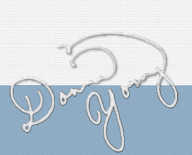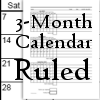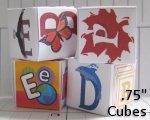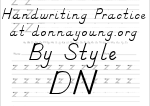Donna, fix this page
Science for Children in Grades 4-6
During this 3 year period, your children will study basically the same topics they covered earlier but in more depth. See Science Outline to get an idea of what to cover. It only goes to 5th grade though, sorry about that. :) There is also a list below.
Initial ideas for this age group
Humans: During this time start with the things you can see, such as the eyes, ears, mouth, nose, etc and learn the names of the parts, draw them too. After that, each year go into more depth such as skeleton, circulatory, organs, revisit the senses..... This is also the time to talk about reproduction in humans, plants, and animals.
Animals, bugs, plants: Learn their different parts too. How they breathe, eat, (who eats, gets eaten, and who makes their own food) and so on. Study live specimens if you can. Grow some plants. Look at things through a magnifying glass. This is the earth worm, ant farm, tadpole-to-frog, caterpillar-to-butterfly period --- try to do most of them.
Bird observations should become a more refined. Study the stars too, make drawings and notes in a journal. Choose a native tree, identify it, learn how to identify that particular kind of tree during each of the four seasons.
During the last year, work on refining lab techniques: Care of equipment, how to use equipment, how to clean and put away. How to make notes during an experiment, how to: make charts, make graphs, make drawings, and write a few sentences about results...
Sample topics for this age group
These are listed in no particular order
| -Plants and Seeds Structure -Biological Organization -Classification System -Insects and Reptiles -Ecosystems -Food Chains, (producers, consumers, decomposers) -Human physiology systems -Cells -Bacteria -Molds -Classification of living things -Microbes -Algae and fungi -Conservation -Nuclear energy -Elementary geology |
-Earth's Composition -Properties and Uses of Light (speed and direction, reflection, refraction, lasers, the color spectrum) -Basics of Oceans (tides, waves, current, geography of floor - ridges, trenches, life) -Fresh water & the water cycle -Weather - The Universe -Electricity -Magnetism -Landforms -Electricity and uses -Inventions |
-Uses Measuring Devices, Graphing -Techniques of Observation and Experimentation -Machines and How They Work -Graph obtained data, using millimeters, centimeters, meters -Use of Microscope -Atomic Energy -Elements and compounds -Simple Astronomy -Space travel -Sound, light, and heat -Magnetic and electric interactions |
The books and software titles below have resources to meet some of the needs for this age group. Many resources will be found in the World Book CD-ROMs -- diagrams of human, bug, and plant parts as well as some multimedia resources.
You don't need all of these, be selective!
Nature Studies
Be selective when investing in nature guide
books. TIP: Get guide books that are for your area. It is annoying
to wade through trees of China when you are trying to find the tree in
your backyard. The handiest books to OWN are tree and bird guides.
![]() Handbook of Nature Study
Handbook of Nature Study
By Anna Botsford Comstock | See Review
Don't buy this and then let it sit on your
shelf! Use the lessons for nature studies as well as composition.
The language is quaint and the book is very interesting with much
more tidbits of knowledge than you will find anywhere else.
Encyclopedias: While I prefer
books over disks any day, I prefer the encyclopedias on cd-rom
for science because of the interactive content that some programs
include. If you decide to buy an encyclopedia on cd-rom or if your
computer came with one (Many computers have Encarta) be SURE to look
it over and see what you can use. Look for charts, diagrams,
interactive gizmos and such. Make notes of your findings and work it
in into your school plans.
Science Encyclopedias: I'm sure you have seen them at
bookstores.. they are large, weigh about 5 pounds and cost around
$40. I've got the Kingfisher Science Encyclopedia. Just like
the Handbook of Nature Study it is too
easy to let that big heavy book sit on the shelf and not use it. IF
you get one.. USE it!!
We really enjoyed using TOPS Learning Systems #32 Electricity.  Lab
uses aluminum foil instead of wire. I recommend that you buy some
battery holders, alligator clips, switches, and thin coated wire because
the foil gets HOT. These things can be found at Radio Shack or a similar
store.Favorite
Lab
uses aluminum foil instead of wire. I recommend that you buy some
battery holders, alligator clips, switches, and thin coated wire because
the foil gets HOT. These things can be found at Radio Shack or a similar
store.Favorite
![]() The
Christian Liberty Nature readers are another one of our favorites. Book 4 [My Favorite] is about birds, bugs [contents].
The
Christian Liberty Nature readers are another one of our favorites. Book 4 [My Favorite] is about birds, bugs [contents].
Book 5 is about the human body, senses, eye, ear etc.. and other things
Nature Journal:
Some of your children may be interested in
keeping a nature journal. I recommend that you encourage them to do so. For
starters: Record observations of trees, birds, stars, and weather.
I have various printable pages starting at: Nature Journal

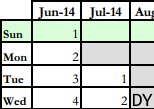
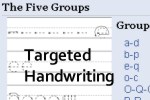 Targeted Teaching Manuscript Handwriting
Targeted Teaching Manuscript Handwriting Learning About Color
Learning About Color One of Donna's Menu Planner
One of Donna's Menu Planner